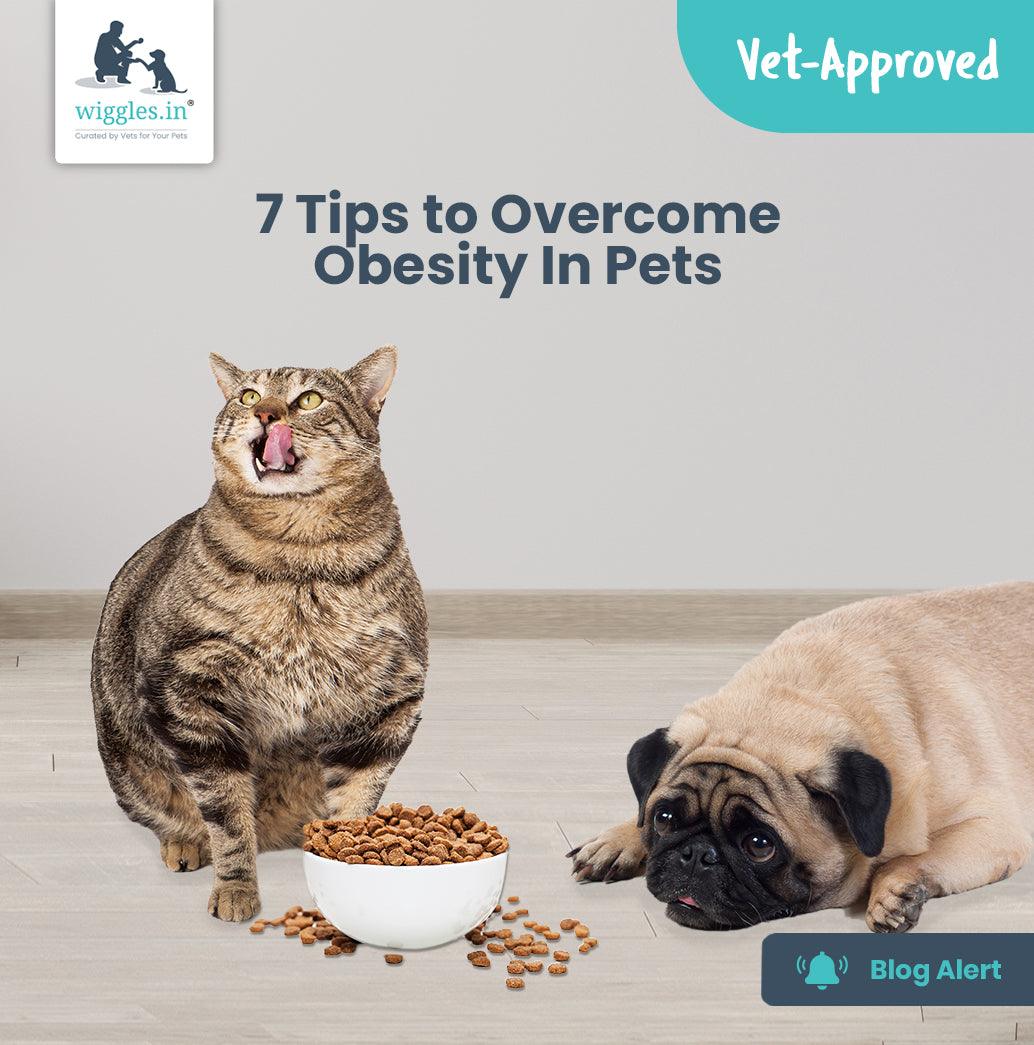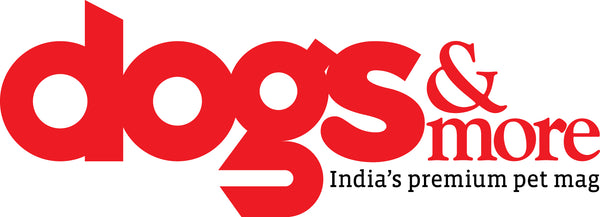Obesity is a major health issue when it comes to humans as well as pets. Due to our modern lifestyle and the lockdown, our daily activities like going to buy groceries or a walk in the park have reduced drastically as everything is available at our doorstep. This sedentary lifestyle is also affecting our pets' health as their walks are limited to just peeing and pooping. This in turn has made pets inactive making them gain extra kilos and even becoming obese. But we can change this and help our pets. Let’s understand what obesity in dogs and cats is, the causes, health risks, signs and treatment options for it.
What is obesity in pets?
Obesity in pets is nothing but the accumulation of excess body fat. Excess body weight and excess body fat in dogs and cats are two sides of the same coin. Hence, a dog or cat who weighs on the heavier side may also be obese. Dogs and cats are considered to be obese when they weigh 20% more than their ideal weight. The ideal weight may differ depending on the pet’s breed. Obesity in pets can be recognized by their body condition score (a visual assessment of the amount of fat and muscle) and their quality of life with respect to their age.
What causes obesity in pets?
One of the main reasons for obesity in pets is lack of knowledge and awareness regarding proper nutrition and exercise. But luckily, help and information is out there. For example, during the puppy stage, it is recommended to feed puppies 4-5 times a day and gradually decrease the frequency of feeding as the age increases. But pet parents lack awareness and they continue with the same feeding schedule for their adult dogs and are put at a risk of obesity. Many pet parents, especially cat parents, continue to feed their pet as much as they demand without realizing the number of calories their pets are consuming.
Hypothyroidism, genetics and surgery are other major health issues that are responsible for weight gain in pets. Here’s how each of them can affect your pet:
Hypothyroidism
Hypothyroidism directly affects metabolism. It results in lethargy, mental dullness, exercise intolerance (the reduced ability of the heart to perform activities) along with weight gain. Dogs like Golden Retriever, Doberman Pinscher, Irish Setter, Dachshund, Cocker Spaniel are more prone to Hypothyroidism. Obesity is extremely rare in cats, however there could be a few exceptions and that’s where their diet can be curtailed along with a generous amount of exercise.
Genetics
Like humans, pets also inherit good and bad traits with their genetics. Breeds like Cocker Spaniel, Beagle, Dachshunds, Labrador Retrievers, Rough Collies, Pugs, etc are more likely to suffer from genetic weight gain.
Surgery
Surgeries like spaying and castration are often responsible for weight gain in pets. The most common reason for weight gain in neutered animals is their lower energy requirement where they continue to have the same amount of calories as the intact animal with slow metabolism. The hormonal changes (level of sex hormones) increase the metabolic rate in non-neutered pets. But after neutering pets, the sex hormone level drops down resulting in a low metabolic rate.
Health risks associated with obesity in pets
The health risks associated with overweight dogs and cats are serious and should not be avoided. Some health risks in overweight pets are:
- Weakened joints, bones
- Diabetes
- Heart diseases and increased blood pressure
- Decreased stamina
- Decreased liver function
- Difficulty in breathing
- Skin and coat problems
- Decreased immunity
- Digestive problems
- Increased risk of cancer
- Reduced length and quality of life
While this list is not exhaustive and pets can suffer from several ailments due to obesity, help is always out there. You should contact a vet or a nutritionist at the first signs of obesity and try to avoid the occurrence as much as you can.
How can you tell if your pet is obese?
Many pet parents want their pooches and kitties to be fluffier and healthier and while trying to achieve this goal they forget about their pet’s daily calorie needs that fit their lifestyle, age and breed. This positive intention of the pet parent may have some negative effects on the pets. Some signs of obesity you may see in your pets are:
- Tiredness/lethargy
- Reluctance to play
- Abdominal sagging
- Joint pain
- Excessive panting
- Skin infection due to skin folds
- Arthritis
- High blood pressure
- Heart disease
All these minor symptoms can lead to a lower life expectancy in pets and many other health problems. Hence it is important to take the appropriate measures to keep our pets healthy and strong.
7 Tips to overcome obesity in your pets
Mentioning the very popular and apt quote here- “Prevention is better than cure.” When it comes to obesity, preventing it is the best option for pet parents and their pets. However, if your pet is obese and needs help to reduce their weight, here are some steps that can help overweight dogs and cats.
Tip 1: Right nutrition and diet
The root cause for obesity in dogs and cats is overconsumption of calories and a deficit in exercise. To uproot this, the right nutrition, diet plan and exercise play a major role. A pet’s energy and nutrition requirements change according to their species, breed, age and lifestyle. For example, a small breed dog with less activity requires 180 to 370 calories per day. When it comes to a dog who weighs around 30 kgs, their calorie requirement increases to 1100 a day and the calorie requirement for a 40 kg dog would be about 1700 per day.
If your pet is 10-15% above their body weight, it is time to visit your vet or book an appointment with a pet nutritionist. A pet nutritionist can provide you with a proper diet plan after understanding your pet’s needs, age and any underlying issues. Custom diet plans are extremely beneficial as they are curated by an expert and can provide a diet that will specifically benefit your pet.
Tip 2: Exercise
Exercise by incorporating healthy and playful activities in their day-to-day life. Some exercises that can help your pet are:
- Puzzles to keep them mentally stimulated
- Daily walks according to their body’s needs and capabilities
- Indoor games like tug-of-war or hide and seek
- Introducing them to new pets in the neighborhood
- Obstacle games
- Weekly swimming or gym sessions (Do check with your vet before taking your pet for swimming or to the gym) Hydrotherapy is great to help obese pets lose weight.
These exercises will help your pets lose those extra kilos from their body along with added benefits like strong joints and flexibility. If your pet is having a tough time exercising, speak to a vet about easy exercises or alternative treatment options for your pet.
Tip 3: Know the difference between hunger & begging
Begging is not always a cry out of hunger, your pet could be asking for attention as well. The best way to avoid overfeeding them is to keep a track of the time of feeding and the quantity of the food. This way, when they beg you’ll notice the cry is for your attention and not food. If your pet is eating way more than they’re supposed to, consult a trainer as some pets eat out of anxiety, fear or stress. Make sure that they are always well-hydrated. A professional trainer or behaviorist can help identify what the issue is and suggest treatment methods.
Tip 4: Limit their treats and no human food
Think of giving treats to pets as giving candy to children, too much of it is never good for them! If your pet is already obese look for healthy and low-calorie treat options and limit the number of treats you give to them. Giving your table scraps is a strict no-no even when they make puppy eyes at you.
Treats infused with Hemp Seed Oil and Sea Buckthorn Pulp that are delicious and help in training
YKibble™ for Dogs and Puppies that can help manage weight
Wiggles Wet Food - Ready to Serve with healthy ingredients for a complete and balanced meal
Tip 4: Try topical oils to relieve pain
A majority of obese dogs and cats suffer from arthritis or pain in their muscles and joints. When treating such pets who are already being administered oral medication, supplementary topical application works as a boon. Oils like CannaPaw™ that is a cannabis leaf extract and Hemp Seed Oil are herbal and natural remedies that help pets of any age in relieving their muscle or joint pain.
Hemp Seed Oil is a natural remedy that can help obese pets deal with pain and skin issues
CannaPaw™ relieves arthritis pain, sore muscles and deal with skin issues
Tip 5: Incorporate changes gradually
Most importantly don't make your pet crash diet by including any sudden changes in their diet. It can have adverse effects on your pets as it can put them in stressful situations which can further increase health problems.
Tip 6: Regular vet visits
Make sure you visit your vet regularly and update them with your pet’s progress. Regular vet visits can also help in the early detection of any health concerns and treat them right from the beginning. Giving supplements like immunity boosters and calcium syrups right from the appropriate age can help to minimize the chances of diseases in your pets.
Tip 7: Stick to the regime
Many studies have shown that a majority of pets regained their weight after successfully losing some kilos. Don’t let this happen to your pet and stay consistent with the newly formed routine to help your pet live a long and healthy life.
Conclusion
In conclusion, let's take a quick look at some of the key points that can help you reduce your pet’s weight:
- Consult a pet nutritionist and follow a diet plan
- Regular exercise
- Limited, healthy treats and no human food
- Natural & topical oils to relieve pain
- Regular vet visits
Our vets, trainers, behaviorists, dieticians and groomers are only a call away like they’ll always be. Just call +91 8431620000 to get in touch.
Team Wiggles has also started an initiative called #BondedByBlood through which we are trying to create an online repository of ready pet donors. Register your pet today & save a life tomorrow - https://bit.ly/BBBDonorRegistration
Join Wiggles Tribe, our 20k+ community of pet parents on Facebook where our in-house team of vets help to answer your pet-related queries 24/7.
*Disclaimer: This blog is vet-approved and includes original content which is compiled after thorough research and authenticity by our in-house team of vets and content experts. It is always advisable to consult a veterinarian before you try any products, pet food or any kind of treatment/medicines on your pets, as each pet is unique and will respond differently.


















